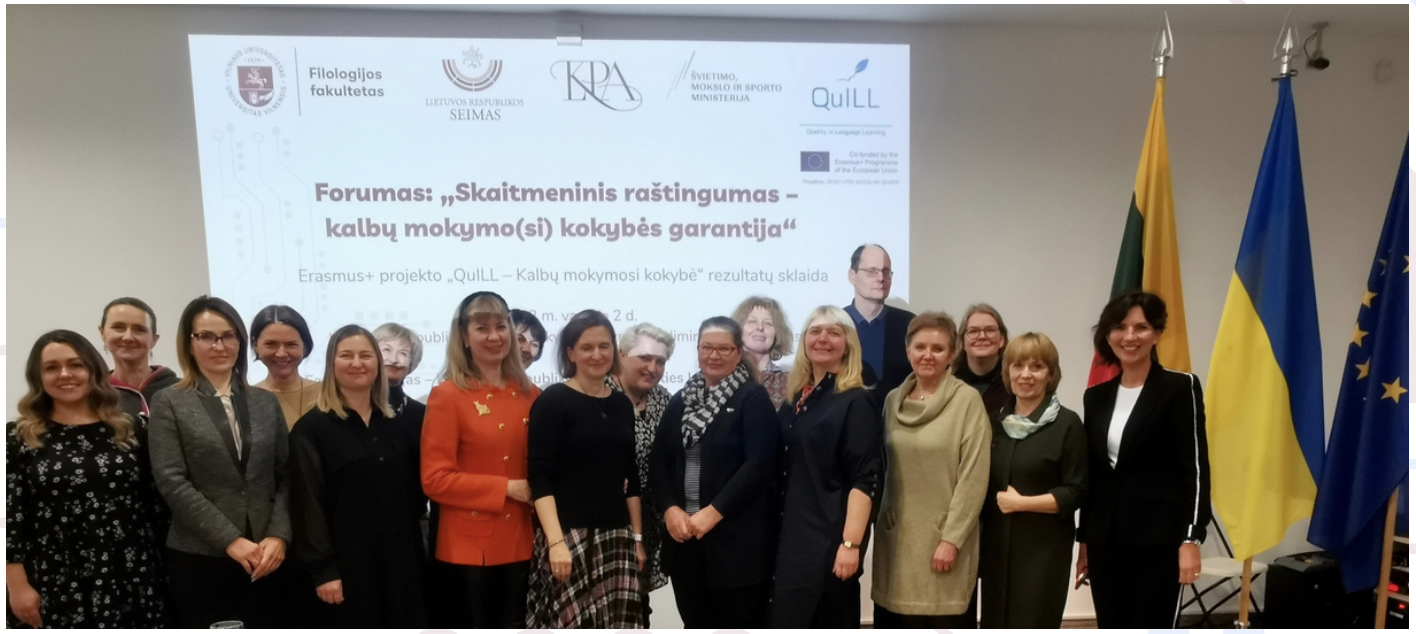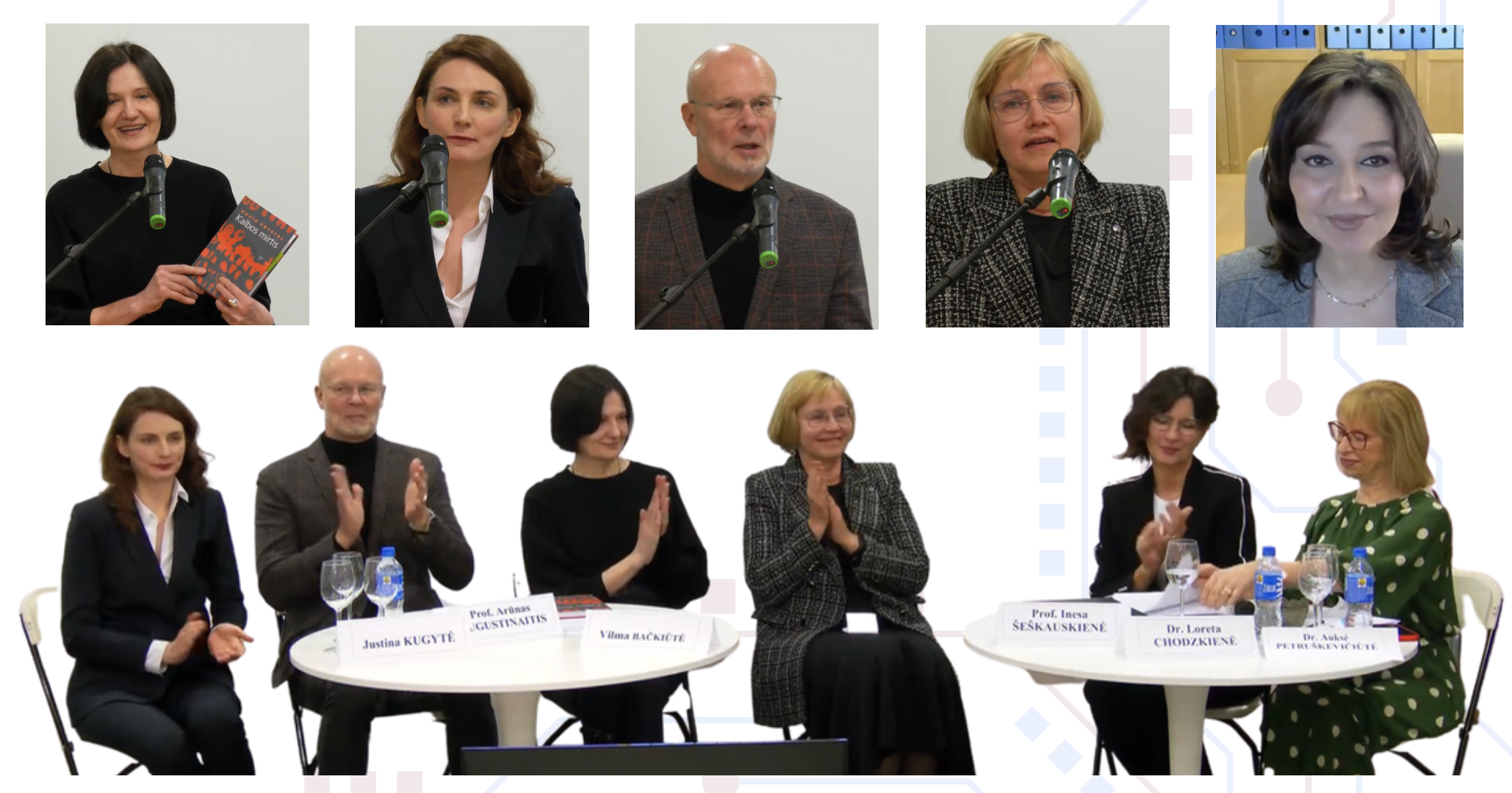How can the content of educational learning/teaching materials be brought to life by harnessing digital tools, and what can we do to make language learning more engaging? Such issues were discussed by policy makers, language lecturers, and language learners at the forum “Digital literacy as Quality Assurance in Language Teaching. Erasmus+ project 'QuILL – Quality in Language Learning' multiplier event”organised by the Faculty of Philology, Vilnius University. The patron of the forum was Prof. Raimundas Lopata, Chairman of the Future Committee of the Parliament of the Republic of Lithuania.
The topics of technology and language learning and teaching were also covered from different angles in introductory speeches by representatives from: the Office of the President of the Republic of Lithuania (Vilma Bačkiūtė), the Ministry of Education, Science, and Sport (Justina Kugytė), the Future Committee of the Parliament (Prof. Arūnas Augustinaitis), the Dean of the Faculty of Philology at Vilnius University (Prof. Inesa Šeškauskienė), and the President of PIXEL (Dr. Elisabetta Delle Donne).

The programme of the forum consisted of three parts: the audience was introduced to the digitisation strategy of education in the Republic of Lithuania and some case studies on how it is already being implemented were reviewed. The intellectual outputs (IO) of the Erasmus+ project 'QuILL – Quality in Language Teaching' produced by the language lecturers of the Faculty of Philology at Vilnius University in cooperation with Partner colleagues were presented to the audience.
The impact of these IO in line with the changes taking place in the country, both in education policy and language pedagogy was discussed. Some examples of good practice while applying 'QuILL' outputs to language classes were shared, and the future perspectives of language teaching were highlighted.
Šarūnas Dignaitis, Head of the 'EdTech Lithuania' Association, provided an overview of the challenges and opportunities of digitalisation of education, Algimantas Kartočius, Coordinator of the 'EdTech Centre' of the 'National Agency for Education' outlined the opportunities for educators for professional development at the 'EdTech Centre'. Loreta Chodzkienė, Institutional Coordinator of the 'QuILL – Quality of Language Teaching' project, highlighted the contribution of the language teaching communities in Latvia, Estonia, and Lithuania to the development of the project’s intellectual outputs. Ernesta Kazakėnaitė, lecturer of the Faculty of Philology of Vilnius University, shared examples of good practice in the application of the QuILL intellectual outputs. Prof. Mariam Manjgaladze from Caucasus University, Georgia (Sakartvelo), who taught Georgian at Vilnius University a few years ago, gave an overview of the situation of teaching Georgian as a foreign language at higher education institutions in her country. We were privileged to be joined by the academic coordinator of the whole QuILL initiative, Dr. Elisabete Mendes Silva, who spoke from Braganca (Portugal) about the outcomes of the cooperation of all the project partners.

Daiva Pagojienė from Klaipėda University drew the audience's attention to the situation of teaching Lithuanian as a non-native language and the rather limited choice of digital resources in Lithuanian. Vigilija Žiūraitė, a PhD student at VMU, shared her experience on how to teach languages innovatively using ICT tools,; she provided a wealth of practical examples of digital tools and apps. The presentation prepared by Agnė Juškevičienė, Associate Professor at the Faculty of Philosophy of VU, and Vitalija Kazlauskienė, Associate Professor at the Faculty of Philology of VU, introduced the participants to the future digitisation of educational content through another project.
Thank you to everyone who contributed to the success of the project by being a project partner, disseminating information, contributing materials, testing the resources, providing feedback for the research, presenting their ideas, making sure everything ran smoothy behind the scenes, moderating, providing a wonderful welcome at the venue, and being active audience members by asking interesting questions!
Watch the webcast of the event here >>

